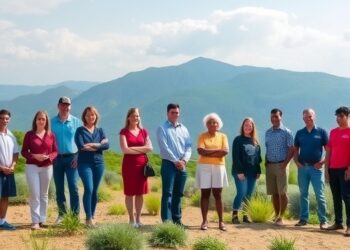In 2017, the Minamata Convention on Mercury went into effect, designed to help curb mercury emissions and limit exposure across the globe. However, a new study of mercury levels in soil suggests that the treaty’s provisions might not be enough. The study published in ACS’ Environmental Science & Technology estimates that soil stores substantially more mercury than previously thought, and it predicts that increases in plant growth due to climate change may add even more.
In 2017, the Minamata Convention on Mercury went into effect, designed to help curb mercury emissions and limit exposure across the globe. However, a new study of mercury levels in soil suggests that the treaty’s provisions might not be enough. The study published in ACS’ Environmental Science & Technology estimates that soil stores substantially more mercury than previously thought, and it predicts that increases in plant growth due to climate change may add even more.
Mercury is a persistent environmental pollutant, moving through air, water and soil, and accumulating within plants and animals. Soil is the primary reservoir for mercury, storing three times the amount found in the oceans and 150 times the amount found in the atmosphere. Typically, the heavy metal naturally moves through these reservoirs, but humans have altered this cycling. Human-caused climate change increases carbon dioxide levels, promoting vegetation growth and most likely depositing more mercury in the soil when the vegetation decomposes. Previous studies on soil mercury levels have mostly focused on small, regional scales. But Xuejun Wang, Maodian Liu and colleagues wanted to develop a more accurate, worldwide model of soil mercury levels that could take into account the effects of a continuously warming climate.
The team began by compiling nearly 19,000 previously published soil mercury measurements, producing one of the largest databases of its kind. The dataset was fed into a machine learning algorithm to estimate the global distribution of mercury in both topsoil and subsoil. They found that the total amount of mercury stored in the first 40 inches (around 1 meter) of soil is approximately 4.7 million tons. This value is double what some previous estimates concluded, though some of those studies accounted for a shallower depth of soil. The team’s model identified the highest levels of mercury in plant-dense areas such as low latitudes of the tropics, but also in permafrost and areas with high human density. Conversely, bare land such as shrubland or grassland had relatively low levels of soil mercury.
To understand how climate warming could affect mercury soil levels, the researchers combined their initial model with datasets of environmental factors representing future climate scenarios. Their model predicts that as temperatures increase around the globe, vegetation growth will be promoted as well, which could raise soil mercury levels in turn. This symbiotic effect would outweigh the reduction efforts proposed by current worldwide control schemes, like those in the Minamata Convention. Though additional research and observations are needed, the researchers say that this work emphasizes the need for stricter, long-term and simultaneous control of mercury and carbon dioxide emissions.
The authors acknowledge funding from the National Natural Science Foundation of China; the High-Performance Computing Platform of Peking University; the Beijing Natural Science Foundation; the China Postdoctoral Science Foundation; and the Fundamental Research Funds for the Central Universities, Peking University.
The paper’s abstract will be available on Aug. 14 at 8 a.m. Eastern time here:
For more of the latest research news, register for our upcoming meeting, ACS Fall 2024. Journalists and public information officers are encouraged to apply for complimentary press registration by completing this form.
###
The American Chemical Society (ACS) is a nonprofit organization chartered by the U.S. Congress. ACS’ mission is to advance the broader chemistry enterprise and its practitioners for the benefit of Earth and all its people. The Society is a global leader in promoting excellence in science education and providing access to chemistry-related information and research through its multiple research solutions, peer-reviewed journals, scientific conferences, eBooks and weekly news periodical Chemical & Engineering News. ACS journals are among the most cited, most trusted and most read within the scientific literature; however, ACS itself does not conduct chemical research. As a leader in scientific information solutions, its CAS division partners with global innovators to accelerate breakthroughs by curating, connecting and analyzing the world’s scientific knowledge. ACS’ main offices are in Washington, D.C., and Columbus, Ohio.
Registered journalists can subscribe to the ACS journalist news portal on EurekAlert! to access embargoed and public science press releases. For media inquiries, contact newsroom@acs.org.
Note: ACS does not conduct research, but publishes and publicizes peer-reviewed scientific studies.
Follow us: X, formerly Twitter | Facebook | LinkedIn | Instagram
Journal
Environmental Science & Technology
Article Title
“Warming-Induced Vegetation Greening May Aggravate Soil Mercury Levels Worldwide”
Article Publication Date
14-Aug-2024




